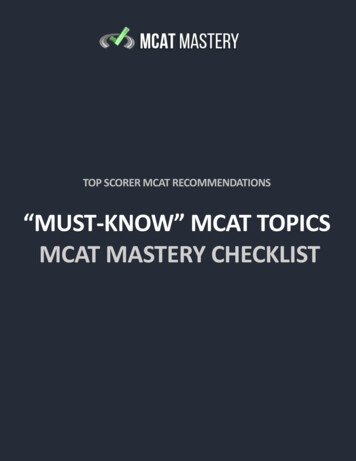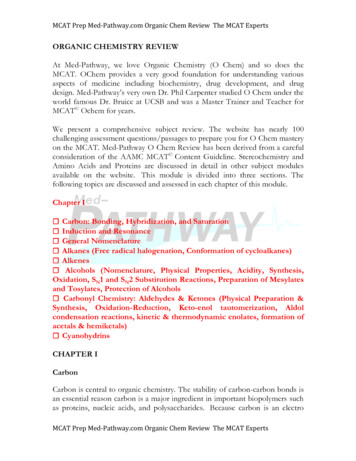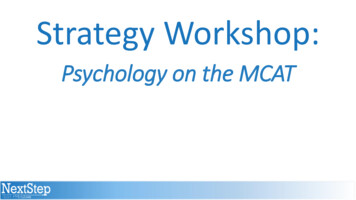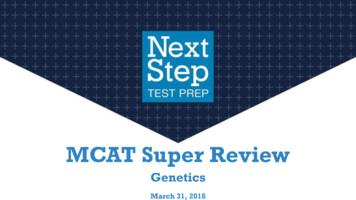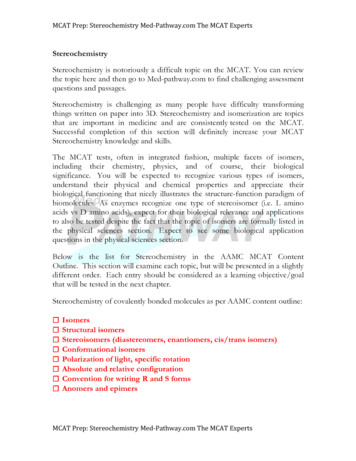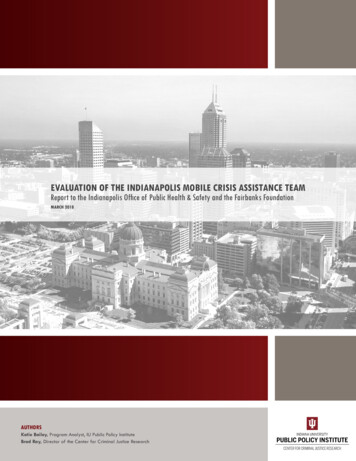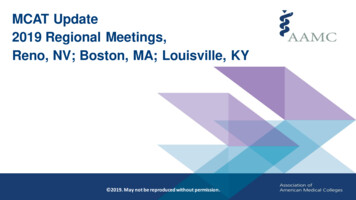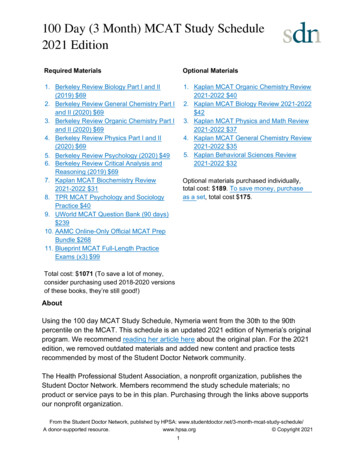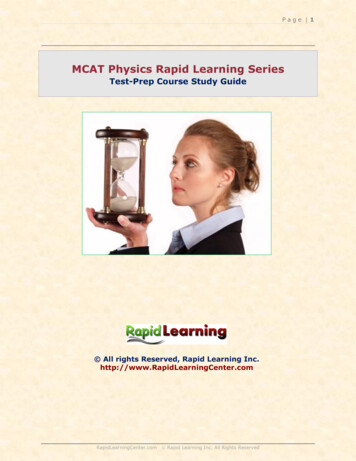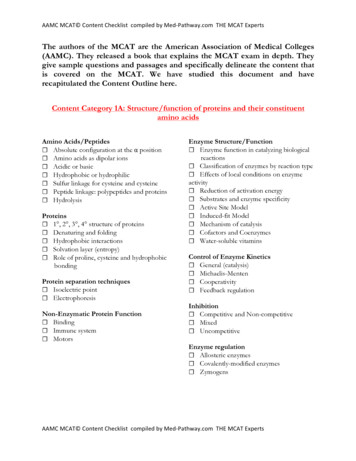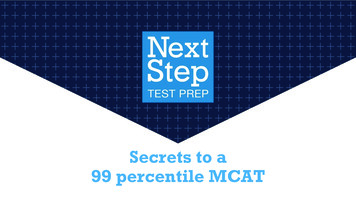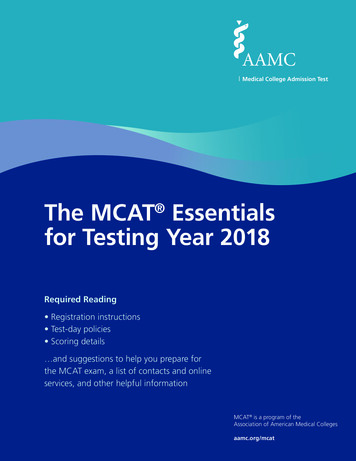
Transcription
Medical College Admission TestThe MCAT Essentialsfor Testing Year 2018Required Reading Registration instructions Test-day policies Scoring details and suggestions to help you prepare forthe MCAT exam, a list of contacts and onlineservices, and other helpful informationMCAT is a program of theAssociation of American Medical Collegesaamc.org/mcat
Prepare for the MCAT ExamThere isn’t a right or wrong way to prepare for the MCAT exam, and knowing how and whereto start can be a challenge. The AAMC has developed resources to help you understand and studyand practice for the exam!How to Create a Study PlanGet a five-step guide to help you create your own study plan. Download it at offers.aamc.org/mcat-study.UnderstandUnderstand what the MCAT exam is and whatit tests.StudyStudy with a full complement of materials.Khan Academy MCAT CollectionWith more than 1,100 free videosand 3,000 review questions, the KhanAcademy MCAT Collection covers allthe content tested on the MCAT exam.The collection was created by KhanAcademy with support and fundingfrom the AAMC and the Robert WoodJohnson Foundation.Interactive Content Tool:What’s on the MCAT Exam?Read the content lists andwatch videos to explorewhat’s tested in the fourexam sections.The Official Guideto the MCAT ExamThis guide is the first andonly official comprehensiveoverview of the new exam.It also includes 120 practicequestions and solutions.The fifth edition of the guidewill be launched this winter!A Roadmap to MCAT Content inPsychology and Sociology TextbooksAssociation ofAmerican Medical CollegesPsychology and SociologyTextbook RoadmapIn this “roadmap,” publishersof introductory psychology andsociology textbooks provide detailedinformation on where to find theconcepts that you’ll need to studyfor the Psychological, Social, andBiological Foundations of Behaviorsection of the MCAT exam.continued Association ofAmerican Medical Colleges
PracticePractice with print and online resources written by the test developers. (Unless noted otherwise, all resourcesinclude both discrete and passage-based questions, as well as solutions to the questions.)Sample TestThe 230-question onlinesample test mirrors the actualMCAT exam in both length andfunctionality. The sample test isa great way to help you identifythe sections you need to focuson the most because it gives youthe number and percentage ofcorrect answers for each section.It does not, however, provide ascaled score.Practice Exams 1, 2, and 3The 230-question online practiceexams have the same featuresand functionality as the MCATexam—with the added benefit ofa scaled score. The third officialfull-length practice exam islaunching in fall 2017!Question PacksEach question pack offers 120practice questions. Buy thepacks individually or as a bundleof six: biology (two packs),chemistry, physics, and criticalreasoning (two packs).AAMCMCAT SectionBankSection BankThe online MCAT SectionBank consists of 300 all-newpractice questions in thenatural, behavioral, and socialsciences, with an emphasis onbiochemistry, psychology,and sociology.FlashcardsThis packet of flashcards contains150 discrete practice questions.You get 25 questions in each ofthese six disciplines: biochemistry,biology, chemistry, physics,psychology, and sociology.Practice with the MCATExam FeaturesPractice with the features ofthe real MCAT exam, includinghighlight, strikethrough,and flag for review.Complete OfficialMCAT Prep BundleThe complete package includesall the current MCAT productsat a significant discount overordering each separately.The Online-Only Official MCATPrep Bundle (without the OfficialGuide and Flashcards) is alsoavailable for you to purchase.Learn more about official MCATresources and practice materials atstudents-residents.aamc.org/mcatprep.17-189 (08/17)
The MCAT EssentialsContentsThe MCAT Essentials for Testing Year 2018 . 5Part 1: The Essential MCAT . 6Exam Content . 6Chemical and Physical Foundations of Biological Systems . 7Critical Analysis and Reasoning Skills . 8Biological and Biochemical Foundations of Living Systems . 8Psychological, Social, and Biological Foundations of Behavior . 9Exam Scoring . 9Part 2: Registration Essentials . 10Eligibility. 10Eligible Health Professions Graduate Programs . 10Obtaining Special Permission . 10International Examinees. 11Before You Register . 11AAMC ID . 11Registering for an MCAT Exam . 12Registration Name/Identification . 12Use of Personal Information . 13Identity Verification Consent . 13MCAT Recruiting Service . 13Health Professions Advisor Release . 14Medical Minority Applicant Registry (Med-MAR) . 14Release to Alternate Contact . 14AAMC Policies Regarding MCAT Examinee Data . 15Testing with Accommodations . 16Part 3: Scheduling Essentials . 16Selecting a Test Date and Location . 16Scheduling Details . 16The AAMC Fee Assistance Program . 17Scheduling Fees and Deadlines . 17Applicable Taxes . 18Changing Your Appointment . 20Cancellations and Refunds . 20Emergency Refund. 21Other Scheduling Details . 21Absences/“No-Shows” . 21Registering for Another Test Date . 22Testing More Than Once and Testing Limits . 22MCAT Appointments are Subject to Change or Cancellation. 22 2017 AAMC. May not be reproduced without permission.V02.06.20183
The MCAT EssentialsPart 4: Test Day Essentials . 23Know the Basics . 23Time Zone . 23Current Address . 23Check-In . 23Providing Valid Identification on Test Day . 23Voiding Your Exam . 25Test Day Rules . 26Testing Room Entrance and Exit . 26In the Testing Room. 27Noteboards . 27Breaks . 27Other Security Rules and Procedures . 28Violations and Investigations . 28Examinee Agreement . 29Test-Day Certification Statement . 32Registration/Scheduling Violations . 33Testing Irregularities . 33Discussion of the MCAT Exam . 34Investigation Procedures . 35Arbitration for Investigation Disputes . 36Reporting Suspected Violations . 36When an Error Occurs . 37Disruptions in Testing and Potential Compromises. 37Reporting a Test Center Concern . 37Test Center Closures or Workstation Outages . 38Test Question Challenges . 38Part 5: Post-Test Essentials . 39Receiving and Sending Scores. 39Receiving Test Scores . 39Score Reporting through AMCAS . 39Score Reporting through the MCAT Score Reporting System . 39Retaking the Exam . 40Rescoring Exams . 40Contacting Us . 41Appendix A: Contacts and Online Resources . 42Appendix B: Scheduling Deadlines . 43 2017 AAMC. May not be reproduced without permission.V02.06.20184
The MCAT EssentialsThe MCAT Essentials for Testing Year 2018Congratulations! Reading this guide is the first step in preparing yourself to take the MCAT exam―another step toward a rewarding and fulfilling career in medicine.The MCAT Essentials is the official policy and procedure guide for the MCAT exam. The followingpages will provide you with fundamental information about registration, scheduling, test day policies,rules to protect the integrity of the exam, and post-test procedures. You will also find a brief overview ofexam content and scoring, a list of contacts and online services, as well as other helpful information.The information included in this guide is necessary for a smooth registration, scheduling, and testingexperience. At the time of registration and on test day, you will be asked to certify that you agreeto comply with the policies and procedures contained within The MCAT Essentials.If you are a returning examinee, you must read The MCAT Essentials associated with your newappointment. Note, The MCAT Essentials is subject to change. The version applicable to you is theversion in effect at the time of registration.The AAMC provides the MCAT exam with the assistance of its test delivery administrator, PearsonVUE.Please contact us if you have questions after reading this guide. You will find contact information forMCAT staff and related resources in Appendix A.All of us at the Association of American Medical Colleges (AAMC) wish you the best and muchsuccess as you move forward with your career in medicine. 2017 AAMC. May not be reproduced without permission.V02.06.20185
The MCAT EssentialsPart 1: The Essential MCATThe Medical College Admission Test (MCAT ) is a standardized, multiple-choice exam that has beenpart of the medical school admissions process for 90 years. Almost all medical schools in the UnitedStates, and many in Canada, require applicants to submit recent MCAT scores as part of theirapplication, and many health professions and graduate programs accept MCAT scores in lieu of otherstandardized tests. Considering its widespread acceptance, it is no surprise that more than 85,000examinees sit for the exam each year.The MCAT exam tests you on the skills and knowledge medical educators and physicians haveidentified as key prerequisites for success in medical school and in the practice of medicine. Content isdivided into four multiple-choice sections and is delivered as a computer-based exam. The MCAT examdoes not contain a written portion or writing sample.In conjunction with its member medical schools, the AAMC develops and administers the MCAT exammultiple times each year at hundreds of test sites throughout the United States and Canada, as well asselected locations throughout the world.Exam ContentThe MCAT exam has four test sections: Chemical and Physical Foundations of Biological SystemsBiological and Biochemical Foundations of Living SystemsPsychological, Social, and Biological Foundations of BehaviorCritical Analysis and Reasoning SkillsThe first three listed sections are organized around 10 foundational concepts or “big ideas” in thesciences and draw from the following disciplines in year-long, introductory courses in: biology, organicchemistry, general chemistry, and physics, and from first-semester introductory courses in biochemistry,psychology, and sociology. Questions in these sections will ask you to combine your scientificknowledge from multiple disciplines with your scientific inquiry and reasoning skills.The final listed section, Critical Analysis and Reasoning Skills, includes questions that test your abilityto comprehend and analyze what you read and requires no specific outside content knowledge.Each of the four sections of the exam include some “field test” or experimental questions (i.e. questionsthat are being considered for future use and do not count toward your total score.AAMC and its members are actively working to promote a more diverse population within the study ofmedicine. It is hoped that the content and skills tested on the exam will encourage people from broadeducational backgrounds to apply to medical school.Full details on the exam content and skills can be found in our What’s on the MCAT Exam? tool.You can also watch this two-minute video to learn more about the MCAT Exam. 2017 AAMC. May not be reproduced without permission.V02.06.20186
The MCAT EssentialsThe chart below provides an overview of the entire MCAT exam as administered on test day:Exam OverviewSection# of QuestionsTime AllottedTest-Day Certification4 minutesTutorial (optional)Chemical and PhysicalFoundations of BiologicalSystems10 minutesBreak (optional)Critical Analysis and ReasoningSkillsMid-Exam Break (optional)Biological and BiochemicalFoundations of Living SystemsBreak (optional)Psychological, Social, andBiological Foundations ofBehavior5995 minutes10 minutes5390 minutes30 minutes5995 minutes10 minutes5995 minutesVoid Question3 minutesSatisfaction Survey5 minutesTotal Content Time6 hours 15 minutesTotal “Seated” Time*Approx. 7 hours 27 minutes*Total seated time does not include check-in time upon arrival at the test center.Chemical and Physical Foundations of Biological SystemsThe Chemical and Physical Foundations of Biological Systems section asks you to solve problems bycombining your knowledge of chemical and physical foundational concepts with your scientific inquiryand reasoning skills.The Chemical and Physical Foundations of Biological Systems section includes: A total of 59 questions consisting of:o 10 passage-based sets of questions 4–6 questions per seto 15 independent questionsConcepts tested in this section are typically taught at many colleges and universities in introductory,year-long courses in biology, organic chemistry, general chemistry, and physics, as well as in firstsemester biochemistry courses. Most questions are organized around descriptive passages with multiple 2017 AAMC. May not be reproduced without permission.V02.06.20187
The MCAT Essentialsquestions per passage. The remaining questions are not based on descriptive passages and areindependent of each other.To learn about the Chemical and Physical Foundations of Biological Systems section in greater detail,visit our What's on the MCAT Exam? tool.Critical Analysis and Reasoning SkillsThe Critical Analysis and Reasoning Skills section asks you to read and think about passages from awide range of disciplines in the social sciences and humanities. Passages are followed by a series ofquestions that lead you through the process of comprehending, analyzing, and reasoning through thematerial you have read.The Critical Analysis and Reasoning Skills section includes: A total of 53 questions consisting of:o 9 passages 5–7 questions per passageParticipation in undergraduate courses in the humanities and social sciences will enhance yourperformance on this section, as will familiarizing yourself with the types of critical thinking andreasoning skills these disciplines use. However, no specific disciplinary knowledge is required.To learn about the Critical Analysis and Reasoning Skills section in greater detail visit our What's on theMCAT Exam? tool.Biological and Biochemical Foundations of Living SystemsThe Biological and Biochemical Foundations of Living Systems section asks you to solve problems bycombining your knowledge of biological and biochemical foundational concepts with your scientificinquiry and reasoning skillsThe Biological and Biochemical Foundations of Living Systems section includes: A total of 59 questions consisting of:o 10 passage-based sets of questions 4–6 questions per seto 15 independent questionsConcepts tested in this section are typically taught at many colleges and universities in introductory,year-long courses in biology, organic chemistry, and general chemistry, as well as in first-semestercourses in biochemistry. Many of these questions are organized around descriptive passages withmultiple questions per passage. The other questions are not based on descriptive passages and areindependent of each other.To learn about the Biological and Biochemical Foundations of Living Systems section in greater detail,visit our What's on the MCAT Exam? tool. 2017 AAMC. May not be reproduced without permission.V02.06.20188
The MCAT EssentialsPsychological, Social, and Biological Foundations of BehaviorThe Psychological, Social, and Biological Foundations of Behavior section asks you to solve problemsby combining your knowledge of psychological, social, and biological foundational concepts with yourscientific inquiry and reasoning skills.The Psychological, Social, and Biological Foundations of Behavior section includes: A total of 59 questions consisting of:o 10 passage-based sets of questions 4–6 questions per seto 15 independent questionsConcepts tested in this section are typically taught at many colleges and universities in introductory,year-long courses in biology and in first-semester psychology and sociology courses. Most questions areorganized around descriptive passages with multiple questions per passage. The other questions are notbased on descriptive passages and are independent of each other.To learn about the Psychological, Social, and Biological Foundations of Behavior section in greaterdetail, visit our What's on the MCAT Exam? tool.Note: The Psychological, Social, and Biological Foundations of Behavior section is written to beconsistent with DSM-5. For those of you who may have learned about concepts in psychology usingthe previous version, DSM-IV, we have created a resource that helps you understand the changesfrom DSM-IV to DSM-5 that are relevant to the Psychological, Social, and Biological Foundations ofBehavior section.Exam ScoringYou will receive a separate score for each of the four sections of the MCAT exam, as well as a totalscore. Each section is scored from a low of 118 to a high of 132.Your total score is the sum of the four individual section scores and will range from 472 to 528. Every test form of the MCAT exam measures the same basic concepts and skills. However, eachform is different in regard to the specific questions it uses. Because each form has the potential tobe slightly easier or slightly more difficult than another, number-correct scores are converted to ascale that takes into consideration the level of difficulty of the test questions on a given form.This conversion minimizes variability in the meaning of test scores across different forms. There is no penalty for guessing on the MCAT exam. A percentile rank is reported along with each section and total score. The percentile ranks ofscores are the percentages of test takers who receive the same or lower scores than you did.Updates to the percentile ranks will be made on May 1st each year. Beginning in 2018, thepercentile ranks will be updated with all exam results from the most recent three years. 2017 AAMC. May not be reproduced without permission.V02.06.20189
The MCAT EssentialsFor additional information on exam scoring, including a short video and an example score report, pleasevisit our web page on MCAT scores.Part 2: Registration EssentialsEligibilityEligible Health Professions Graduate ProgramsYou may sit for the exam if you are preparing to apply to and attend a health professions school thataccepts MCAT scores in admissions and are not currently enrolled in a health professions school. Theseprograms include: MD-granting programsDO-granting programsPodiatric Medicine (D.P.M) programsVeterinary Medicine (D.V.M) programsAny other health-related program that will accept MCAT exam results to satisfy a test scoreadmissions requirementAt the time of registration, you will be required to agree to a statement verifying that you are taking theexam solely for the purpose of applying to and attending a health professions program.If you are not intending to apply to and attend a health professions program, or if you are a currentlyenrolled medical student, you must obtain special permission to register for the exam.Obtaining Special PermissionAs stated above, individuals not meeting the eligibility requirement above must apply for specialpermission to take the MCAT exam. You must apply for special permission if any of the followingstatements are true: You wish to take the test for any reason other than applying to and attending an eligible healthprofessions program You are currently enrolled in an eligible health-professions program and are looking to changeschoolsNote: If you are currently accepted into a health professions program, but have not yet enrolled inclasses, you are not required to obtain special permission. You are unable to comply with all AAMC testing procedures and the inability is unrelated to amedical condition or disability. For medical conditions and disabilities, please refer to theTesting With Accommodations section.To apply for special permission, please ensure you have an AAMC ID and have completed the“Personal Information” tab within the MCAT Registration System. Then, please send an email 2017 AAMC. May not be reproduced without permission.V02.06.201810
The MCAT Essentialsexplaining the reason(s) you are requesting special permissions to mcat@aamc.org. We will attempt toreview and respond to your request within five business days.Please be mindful of scheduling deadlines when submitting your request. There are times during thetesting season when there are a high number of inquiries. We cannot extend deadlines for any reason.Failure to obtain special permission may result in, among other consequences, an investigation by theAAMC, appointment cancellation, cancellation of scores, and/or a ban from taking the MCAT exam fora designated period of time or permanently. See the Violations and Investigations section to learn moreabout the AAMC’s investigation process.International ExamineesThere are no additional eligibility requirements for international examinees. If you are in an MBBS(Bachelor of Medicine/Bachelor of Surgery) degree program or hold the MBBS degree, you mayregister for the MCAT exam without seeking special permission.Before You RegisterAAMC IDYou will need an AAMC ID and an associated username and password to register for the MCAT exam.If you have previously created an AAMC ID at any time or for any reason – which includes creating anAAMC ID to purchase or access other AAMC products and services, such as MCAT practice materials,Medical School Admission RequirementsTM database, Fee Assistance Program, or AMCAS application – you must use that username and password when registering for your MCAT exam.If you do not have an existing AAMC ID, you will be directed to create an account and establish ausername and password when entering the MCAT Registration System.If you cannot remember your username or password, DO NOT create a new AAMC ID. The loginpage provides options to reset your password or request your username. If you are still having problems orencounter problems with the self-service security questions, please contact AAMC Services. You may notcreate multiple AAMC IDs for any reason without the prior written consent of the AAMC.The following are violations of the AAMC’s registration rules that may result in appointmentcancellation, cancellation of scores, a ban from taking the MCAT exam for a designated period of timeor permanently, or other consequences. (See Investigation Procedures): Obtaining more than one AAMC ID Registering for the MCAT exam under another individual’s AAMC ID Allowing someone else to register under your AAMC ID Allowing someone else to
The Medical College Admission Test (MCAT ) is a standardized, multiple-choice exam that has been part of the medical school admissions process for 90 years. Almost all medical schools in the United States, and many in Canada, require applicants to submit recent MCAT scores as part of their
